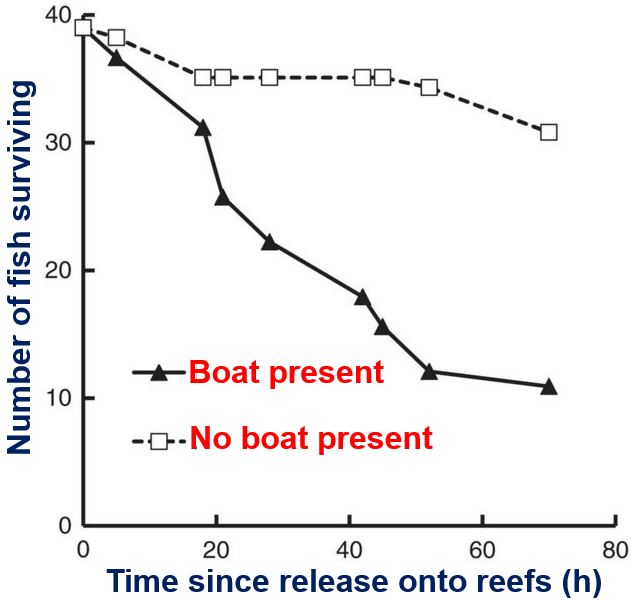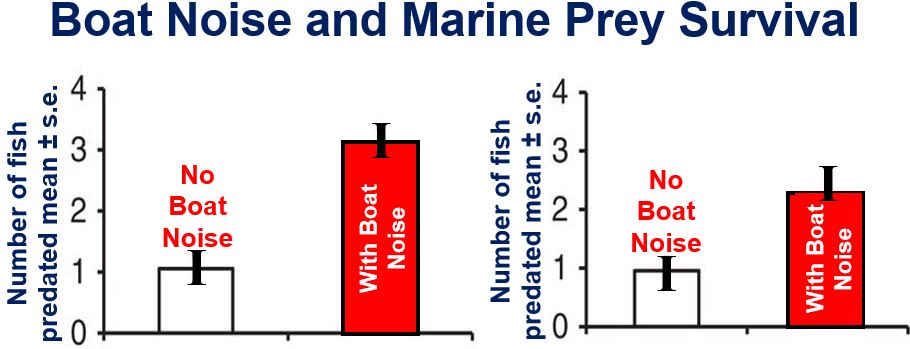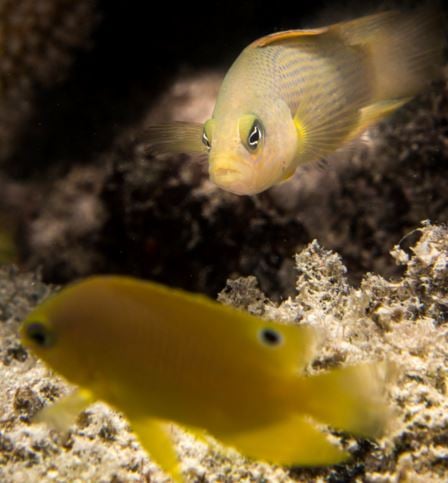Boat noise is bad for marine prey, but great for marine predators. When a boat is motoring nearby, the chances of catching other fish double for the predator, which means that for the prey its chances of dying also double, according to a study carried out by scientists from the Universities of Exeter and Bristol in England, as well as colleagues from centres in Canada and Australia.
Dr. Stephen Simpson, Senior Lecturer in Marine Biology and Global Change at Exeter University’s Faculty of Biosciences and colleagues wrote in the prestigious journal Nature Communications that noise from passing motorboats raises stress levels in young coral reef fish and undermines their ability to escape from predators.
Consequently, they are captured much more easily and their survival chances are reduced by half.
 This graph shows the survival of Damsel fish (P. amboinensis) during 72 hours following release onto experimental patch reefs with boat noise emitted from underground speakers. (Image: Nature Communications)
This graph shows the survival of Damsel fish (P. amboinensis) during 72 hours following release onto experimental patch reefs with boat noise emitted from underground speakers. (Image: Nature Communications)
Boat noise directly affects fish survival rates
The authors claim their study is the first ever to show that real-world noise, which in this case is the common noise emitted by motorboats, can have a direct effect on fish survival.
The researchers hope their findings will inspire improved environmental noise management along coastal waters.
Dr. Simpson, whose work is financed by the ARC Centre of Excellence for Coral Reef Studies and the NERC (Natural Environment Research Council), said:
“We found that when real boats were motoring near to young damselfish in open water, they became stressed and were six times less likely to startle to simulated predator attacks compared to fish tested without boats nearby.”
Stress and poor responses kiss of death for marine prey
Co-author Dr. Andy Radford, Reader in Behavioural Ecology, at the University of Bristol’s School of Biological Sciences, said:
“The combination of stress and poor responses to strikes by predators is why these fish became such easy prey.”
 (Left Graph) Mean±s.e. number of P. amboinensis eaten of 10 individuals during 15 min trials in controlled tank conditions, with and without boat noise. (Right Graph) Same experiment with just 5 individuals. (Image: Nature Communications)
(Left Graph) Mean±s.e. number of P. amboinensis eaten of 10 individuals during 15 min trials in controlled tank conditions, with and without boat noise. (Right Graph) Same experiment with just 5 individuals. (Image: Nature Communications)
The international team of scientists combined field and laboratory experiments, using playbacks and real boat noise, to determine what the survival chances of young Ambon Damselfish might be during encounters with the Dusky Dottyback, their natural predator.
The team is surprisingly optimistic about the possibilities for management of noise and its potential impact.
Noise easier to control than pollution
Regarding controlling noise versus pollution, Dr. Simpson said:
“If you go to the Great Barrier Reef, there is a lot of noise from motorboats in some places. But unlike many pollutants we can more easily control noise. We can choose when and where we make it, and with new technologies, we can make less noise.”
“For example, we could create marine quiet zones or buffer zones, and avoid known sensitive areas or times of year when juveniles are abundant.”
In order to protect the marine environment, an essential first step will be to manage local environmental stressors such as noise, the authors explained.
Co-author, Dr Mark Meekan, Principal Research Scientist – fish biology, at the Australian Institute of Marine Science, which belongs to the Australian Government, said:
“You might argue that climate change is a bigger threat to reef life, but if we can reduce the effect of local noise pollution we build greater resilience in reef communities to looming threats such as global warming and ocean acidification.”
 A Dusky Dottyback, which has the ability to disguise itself as a harmless fish, eyeing up a juvenile Ambon Damselfish. Credit: Christopher E. Mirbach).
A Dusky Dottyback, which has the ability to disguise itself as a harmless fish, eyeing up a juvenile Ambon Damselfish. Credit: Christopher E. Mirbach).
In an Abstract in the journal, the authors wrote and concluded:
“Prey were captured more readily by their natural predator (dusky dottyback, Pseudochromis fuscus) during exposure to motorboat noise compared with ambient conditions, and more than twice as many prey were consumed by the predator in field experiments when motorboats were passing.”
“Our study suggests that a common source of noise in the marine environment has the potential to impact fish demography, highlighting the need to include anthropogenic noise in management plans.”
Citation: “Anthropogenic noise increases fish mortality by predation,” Mark G. Meekan, Stephen D. Simpson, Andrew N. Radford, Mark I. McCormick, Sophie L. Nedelec, Douglas P. Chivers and Maud C. O. Ferrari. Nature Communications 7, Article number: 10544. DOI:10.1038/ncomms10544. 5 February 2016.
